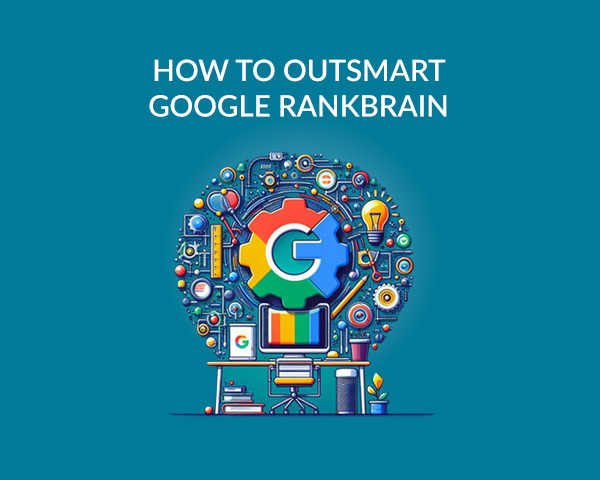
How to outsmart Google RankBrain and stay ahead in the SEO game
Search engine optimisation (SEO) has become crucial for businesses to thrive online.
With Google being the dominant search engine, understanding its algorithms is paramount. One algorithm that has been causing quite a stir is Google RankBrain. Let’s delve into the intricacies of Google RankBrain, how it works, and its impact on SEO.
How does Google Rankbrain work?
Google RankBrain is an artificial intelligence (AI) system that helps Google process search queries and deliver more relevant search results to users. It uses machine learning to analyse the meaning behind search queries, even if they are ambiguous or unfamiliar. This allows Google to process search results and provide the most relevant search results, improving the user experience.
RankBrain uses a variety of factors to determine a web page’s relevance for a specific search query. These factors include:
- content quality
- backlinks
- website speed
- mobile-friendliness
- user engagement metrics (click-through rate (CTR) and bounce rate)
By analysing these factors, RankBrain learns which web pages are more likely to satisfy users, adjusts the Google search results accordingly, and provides the top-ranking pages.
Common misconceptions about Google RankBrain
There are several misconceptions surrounding Google RankBrain that need to be debunked.
One common misconception is that RankBrain solely relies on user engagement metrics like CTR and bounce rate to determine the relevance of web pages. While these metrics are important, RankBrain considers lots of other factors.
Another misconception is that RankBrain only focuses on long-tail keywords. While RankBrain does excel at understanding complex queries, it also considers shorter and more generic keywords. The key is to create and publish content that is relevant and valuable to users, regardless of the length of the keyword.
Key factors to consider in optimising for Google RankBrain
To optimise your website for Google RankBrain, there are several key factors you should consider.
First and foremost, craft and publish only high-quality and relevant content addressing the search intent of your target audience. This includes using natural language and avoiding keyword stuffing.
Next, pay attention to your website’s user experience. Your site must be easy to navigate. It should also load quickly and be mobile-friendly. A positive user experience not only improves your chances of ranking higher but also encourages visitors to stay on your site longer.
Backlinks are also crucial for Google RankBrain. Acquire high-quality backlinks from authoritative websites. These backlinks act as a vote of confidence for your ecommerce site and can significantly improve your rankings.
Focus also on improving website speed. Slow-loading websites frustrate users. Most importantly, it can lead to higher bounce rates. Optimise your site images, minify CSS and JavaScript files, and use caching techniques to improve website speed.
Leveraging AI and machine learning
Stay ahead in the SEO game and outsmart Google RankBrain – embrace AI and machine learning. These technologies provide valuable insights into user behaviour, search trends, and competitor analysis.
Use AI-powered tools to:
- analyse your website’s performance
- identify areas for improvement
- track your rankings
- identify keywords with high search volume and low competition
Machine learning algorithms can also help analyse user engagement metrics and identify patterns that correlate with higher rankings. By understanding these patterns, you can tailor your content and website to meet your target audience’s needs and preferences.
Analysing and adapting to changes in Google RankBrain algorithm
Google’s Search algorithm is constantly evolving. To stay ahead, it is crucial to analyse and adapt to these changes. Stay updated with the SEO trends and Google algorithm updates through industry blogs, forums, and reputable SEO resources.
Monitor your website’s performance regularly and track changes in rankings and user engagement metrics. If you notice a drop in rankings or user engagement, investigate the potential causes and make necessary adjustments to your SEO strategy.
Additionally, leverage data analytics tools. This helps you to gain insights into user behaviour on your website. Analyse the following:
- keywords driving traffic to your site
- pages with the highest engagement rates
- the sources of your backlinks
This data can help you identify areas for improvement and optimise your website accordingly.
Expert tips and best practices for optimising for Google RankBrain
Optimising for Google RankBrain requires a strategic approach. Here are some expert tips and best practices:
- Focus on creating high-quality, valuable content.
- Conduct thorough keyword research.
- Optimise your website for mobile devices.
- Acquire high-quality backlinks.
- Regularly monitor your website’s performance and adapt your SEO strategy accordingly.
By knowing how to optimise for RankBrain, your site can enjoy better ranking in search engines and outsmart Google RankBrain.
For example, our SEO partner Tom has a new client, Studio58 London, a hair salon in Islington who has a newly designed website, whose content will hopefully be seen by google as high quality and offering value in terms of the organic hair care space and rank well on page 1 accordingly.
Conclusion
Google RankBrain is an AI-powered algorithm that plays a significant role in determining search rankings. Understanding how RankBrain works and its impact on SEO helps you to stay competitive and ahead in the SEO game.
By optimising your website for Google Search RankBrain, focusing on user experience, and adapting to algorithm changes, you can outsmart Google’s algorithm and improve your SEO rankings.
Embrace the power of Google RankBrain and incorporate it into your SEO strategy. If you don’t know how to get started, work with SEO professionals. By doing so, you will not only improve your organic search rankings but also provide a better user experience for your audience.


